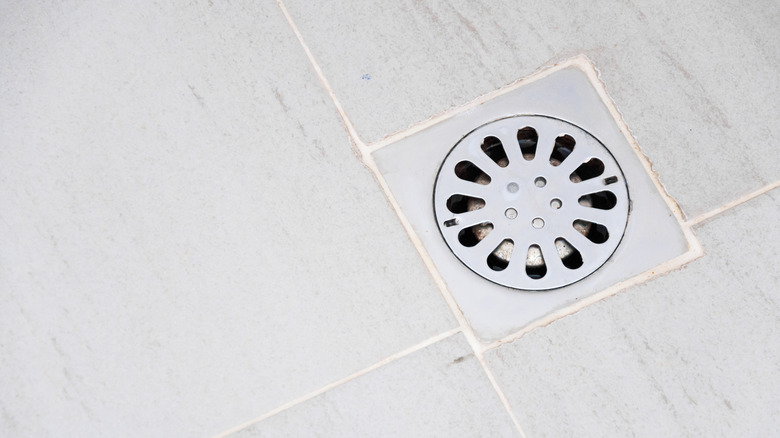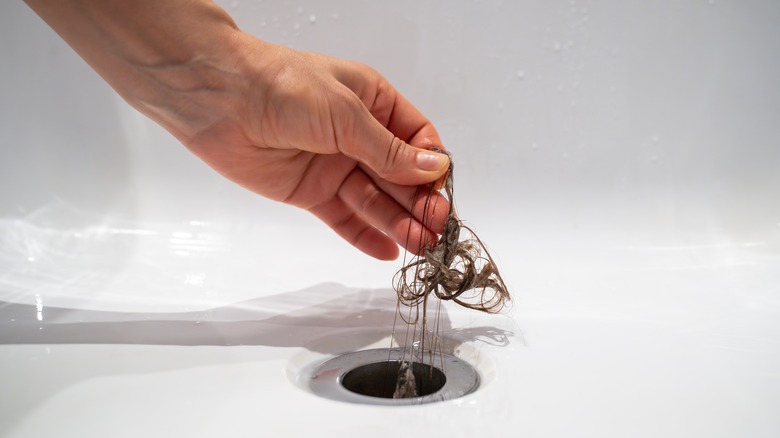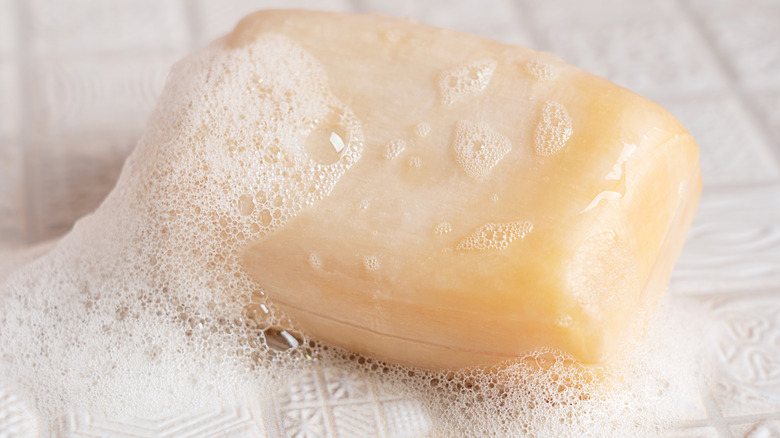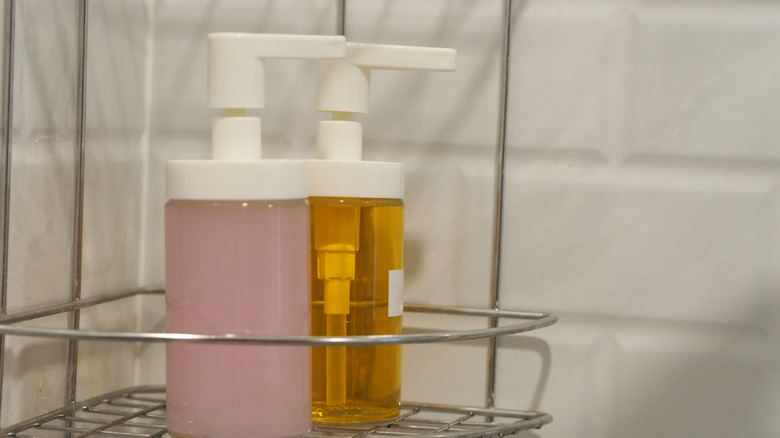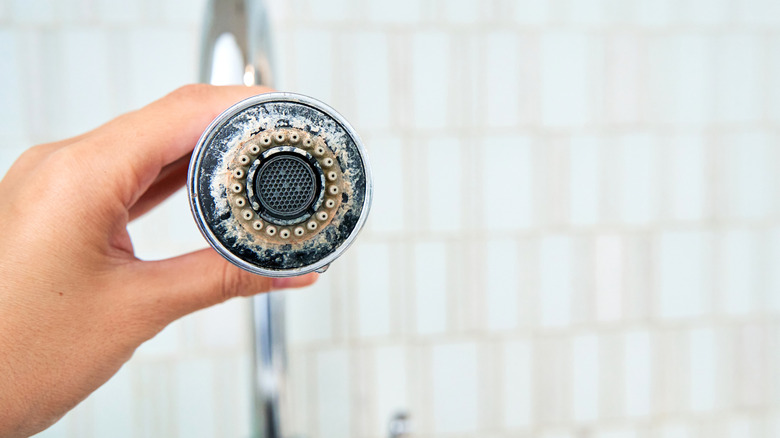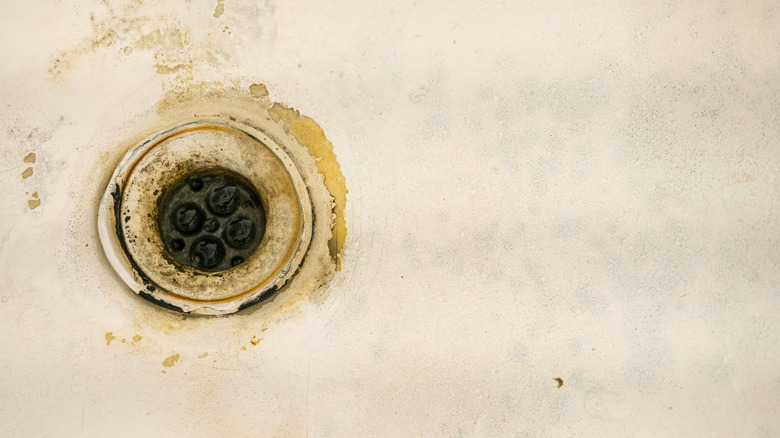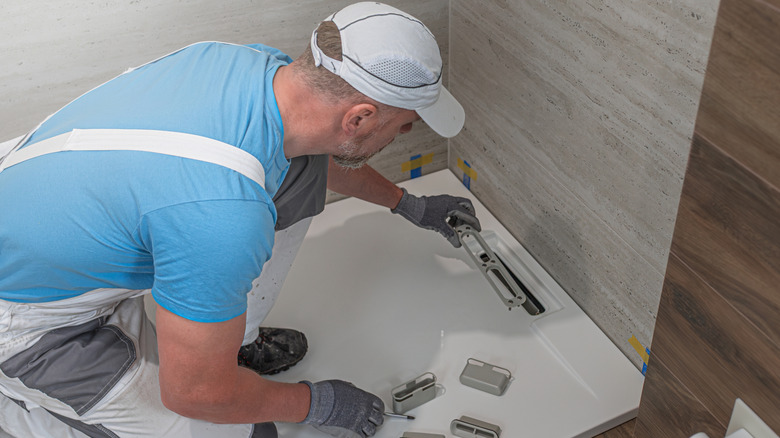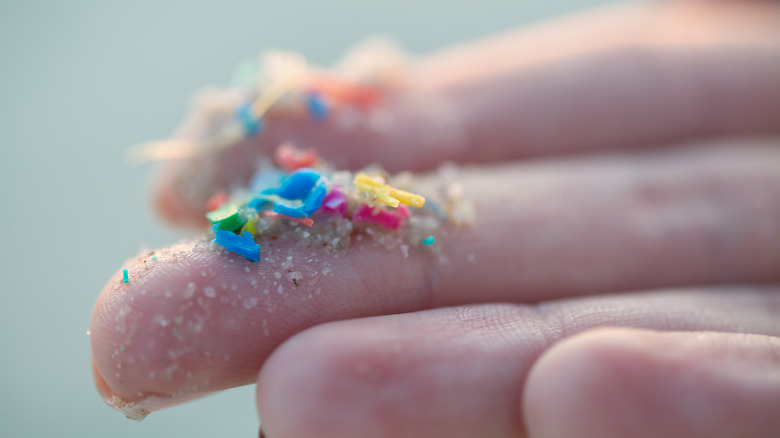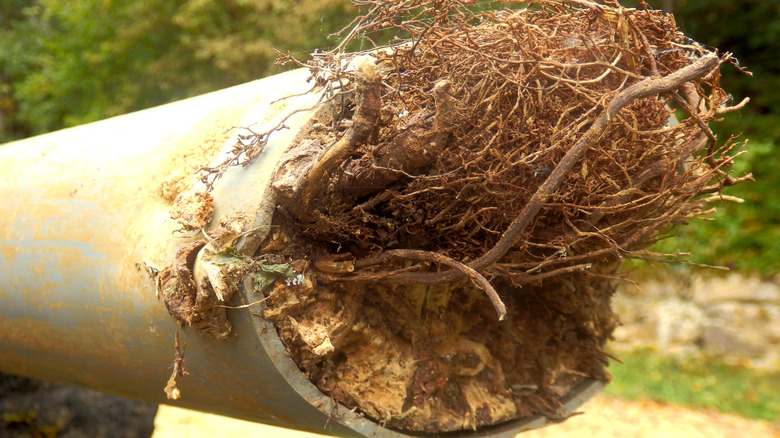9 Common Reasons Your Shower Drain Is Clogged (& The Best Ways To Fix It)
We may receive a commission on purchases made from links.
You're taking a shower, but thanks to a clogged drain, it feels more like a bath. As you're standing in that ankle-deep water, you're wondering exactly what could be the cause of your shower clog. A shower can become slow-draining for several reasons, including a buildup of hair, soap, or even foreign objects. Recognizing the source of your clog can help you figure out the best way to remedy the problem, whether that involves tackling it yourself or hiring a professional plumber.
It's also possible to have a clogged drain without all of that standing water and without even realizing it. Do you ever notice a stinky smell emanating from your drain? This odor might originate from soap residue and hair rotting in your pipes. Other possible warning signs of a problem clog can include bubbling sounds, changes in water pressure, and increased fly activity around the drain. While these clog signs are subtle compared to large pools of water at your feet, they indicate the problem could get worse. Ignoring them could cause the clog to snowball into a big issue as you continually use your shower, until one day, you have little to no draining at all.
Once you identify the source of the clog, however, most of these causes are easy and affordable to fix, often requiring common ingredients you already have. If you're dealing with a shower drain clog, here are the most common reasons and how to fix them so you have water flowing swiftly down the drain once again.
The drain has too much hair
Hair is the most common shower clog culprit as it builds up in the drain. It may clump up with soap residue into a knot, blocking the flow of water. Instead of using chemical drain cleaners, dissolve it with a few drops of dish soap, 1 cup of baking soda, and 1 cup of vinegar. Let the mixture sit in your drain for five minutes, then pour in 1 cup of boiling water before plunging. If this is a frequent problem, consider a hair catcher for your drain, such as the TubShroom.
There's a lot of soap scum from your bar soap
Using bar soap can also lead to a stubborn clog, as the soap's fats and oils interact with the hard water in your home. Repeat use causes a buildup of soap scum that continues trapping residue. One of the easiest ways to remove soap scum clogs from your drain is to slowly fill it with a pot of boiling water to melt it, then briefly run your hot water afterwards. Switching to a liquid soap or body wash can help mitigate the problem in the future.
You have grease and oil blockages from bath products
It's not just food grease that blocks drains; oil-based body and hair products can as well. Shampoo, conditioner, body wash, and face masks may contribute to grease buildup in your drain. Each time you use these products, some oily residue gets stuck to the inside of the pipes when it goes down the drain. When it cools, it congeals and forms a ball of gunk, narrowing the pipe openings. Adding boiling water can melt the clog, and using an enzyme-based drain cleaner, like Green Gobbler, can also help.
Small objects are lodged in the drain
Whether a piece of jewelry, plastic packaging, or a tiny toy your child helpfully threw in the shower, foreign objects lodged in the drain can lead to clogs. It might slide through the drain undetected, only to fall deeper into the piping before it gets stuck. Soap, hair, and other debris from your shower can also wash into it, adding to the problem. You can try to remove foreign objects manually with tweezers or with a wet/dry vacuum. If those methods don't work, hire a professional or use a snake to retrieve it.
Hard water has left too many mineral deposits
Hard water contains dissolved calcium and magnesium. Showering with hard water may lead to mineral traces left in the pipes, where they remain. As they harden and collect, the resulting "rocks" can restrict the space available for flowing water. You can use vinegar and baking soda, but if you have older pipes, be careful as this method can corrode pipe material with repeated use. Pour ½ cup of baking soda and 1 cup of white vinegar in the drain, then let it rest for 30 minutes before you flush with boiling water. After removing the clog, see if your home may benefit from a water softener.
There's a buildup of mold or slime
Although disgusting, there may be mold or slime lurking inside your shower drain, especially if there's a musty bathroom smell. The stench comes from all of the trapped organic material, like skin cells and hair. As mold, mildew, and bacteria feed on it, they form a sticky sludge that coats pipe walls. The stickier the buildup, the harder it is for proper drainage. A green, enzyme-based cleaner made specifically for tackling biofilm can help. Try plumber-recommended Bioda Professional Strength Enzyme Drain Cleaner to clean and deodorize your drain.
Your drain wasn't installed correctly or your plumbing is older
Shower drain clogs may even result from your piping setup. If you live in an older home, you might have narrower pipes or ones with a slope that don't fit your current needs, which could cause a clog. The same applies if you have a new drain that was poorly installed. If you've exhausted all of the other remedies available and you still have shower clogs, contact a plumbing service. They can evaluate your drain setup and determine if there's an issue, then correct it if needed.
You washed too much sand or exfoliating ingredients down the drain
Do you live by the beach? If you and your family members frequently take a shower to rinse off sand in the bathroom, all those little particles can build up in your pipes. In addition, body care products with physical exfoliators, such as walnut shell pieces, sugar, and other gritty ingredients, can also lead to a clog if they don't dissolve. Last but not least, shower bombs, like bath bombs, can clog a drain with glitter, cornstarch, and any other non-dissolving contents.
Tree roots have infiltrated your pipes
Sometimes the answer isn't a clog from household substances, but rather something outside. In this case, tree roots. Tree roots can infiltrate your pipes, physically cracking them and blocking the flow of water. The origin of the problem may even be a single pipe. However, if it's not isolated to a single shower drain, it's likely an issue with the main line, which is why contacting a professional is crucial. If you're planting any trees or shrubs in your yard, be sure to keep at least 10 feet between the house and your main line.
